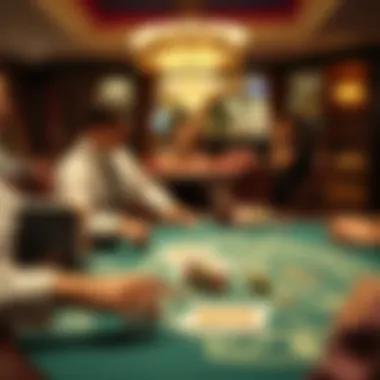Mastering the Art of Hosting Blackjack at Home


Intro
Hosting a blackjack game at home offers a wonderful opportunity to blend the thrill of the casino with the comfort of your own space. But there's an art to making this experience enjoyable for your guests, and it doesn’t hurt to know a thing or two about the game itself. Understanding the essentials—like gathering the right equipment, familiarizing yourself with the rules, and strategies for the smooth dealing—can transform an ordinary gathering into a memorable occasion.
Creating that authentic casino feel involves more than just laying down cards and chips. It’s also about managing the social dynamics within the group, ensuring everyone feels included, and keeping the atmosphere electric. This guide is aimed at both newcomers eager to learn the ropes and seasoned gamers looking to elevate their home blackjack experiences.
Preparation is crucial here; from the right table setup to creating a welcoming environment for players, each choice contributes to the overall vibe. As we dive into the specifics of gameplay, common strategies, and responsible gaming, expect to find insights that pave the way for an enjoyable night of cards and camaraderie.
As the dealer, you'll be the heartbeat of the game. Understanding your role deeply not only enhances the experience for others, but it also allows you to engage better with the players. Let’s dive into some winning game strategies that ensure both enjoyment and skill shine through.
Game Strategies
Essential Tips for Beginners
For those stepping into the world of blackjack for the first time, several fundamental strategies can make a world of difference:
- Know the Basics: Familiarize yourself with the rules—understanding how to play, what the terms mean, and the objective of getting as close as possible to 21 without going over is crucial.
- Start Small: Use low denominations for your chips at first. This approach reduces pressure and provides a comfortable pace for learning.
- Practice Makes Perfect: Before hosting an actual game, consider simulating rounds with a few friends or family members. This rehearsal boosts confidence.
- Keep Track of Rules: It’s useful to have a written guide of basic rules nearby. This can help clear up confusion and keeps the game running smoothly.
- Stay Adaptable: Be aware of players’ needs and adjust your game pace as necessary. Not everyone has the same experience, and the goal is to keep it fun and engaging for all.
Advanced Tactics for Seasoned Players
If you’re already familiar with girding your loins for a blackjack battle, fine-tuning your strategies can give you that competitive edge:
- Card Counting: While it has a reputation as a gambler’s Holy Grail, it requires diligence. Assign point values to cards to track the deal—being discreet is key here.
- Play by Probability: Keeping the basic statistical probabilities in mind can enhance decision-making. Knowing when to hit or stand based on likelihoods often yields better results.
- Manage Your Bankroll: Setting limits and sticking to them is vital. This prevents losses from spiraling and maintains a fun atmosphere.
- Hard Double Down: Understanding when to double down based on the dealer's visible card can swing the odds in your favor significantly.
- Reading Players: Beyond the cards, pay attention to body language and betting patterns. You can learn a lot about other players’ confidence (or lack thereof) by observing their behaviors.
High-stakes gambling at home means everyone should be on the same page regarding rules, stakes, and limits.
With a firm grasp on both beginner strategies and advanced tactics, the stage is set to create an enthralling gaming experience that combines skill and enjoyment. Up next, let's explore how the dynamics of responsible gaming play a key role in keeping the atmosphere welcoming and enjoyable.
Prolusion to Home Blackjack
Hosting a blackjack game at home can be more than just a pastime; it’s an experience. People often think of casinos as the epitome of excitement and glamour, but what if you could bring that thrill into your own living room? This section will lay the groundwork for understanding home blackjack, its significance, and how it can be an engaging social event that enhances relationships among friends and family.
Understanding the Basics of Blackjack
To get the ball rolling, it’s essential to establish what blackjack is all about. The game revolves around a simple goal: beating the dealer by having a hand value closer to 21 without exceeding it. This balance between strategy and luck is what makes blackjack particularly enticing. The common betting system and straightforward rules allow newcomers to step in without feeling overwhelmed.
Key rules to consider:
- The game starts with each player receiving two cards, and the dealer being dealt one card face up and one face down.
- Numbered cards from 2 to 10 hold their face values, while face cards count as 10, and aces can be either 1 or 11, depending on what’s more favorable for the player.
- Players can choose to hit, stand, double down, or split when playing against the dealer's hand—a variety of strategies that keep the game lively.
Learning these basics isn’t just intellectual; it’s the stepping stone for hosting an engaging session among players of varying skill levels. Having a good grasp of these elements sets the foundation for a captivating game night, where complexities can be introduced as players become more comfortable with the dynamics.
Recreating the Casino Environment
To truly replicate a casino vibe at home, you must go beyond just the cards and chips. The ambiance plays a crucial role in setting the mood. Think about sensory details: lighting, sounds, and even the arrangement of your space.
- Lighting: Dim lights mimic the ambiance of a casino, bringing intimacy and excitement. You might consider a few strategically placed lamps or even candles to achieve that desired glow.
- Sound Effects: Background noise can affect everyone’s experience. Consider playing some soft jazz or the subtle sounds of a real casino on a speaker. Even a playlist of popular gambling tunes can enhance the atmosphere.
- Seating Arrangement: Comfort matters. Set the cards on a dedicated table that allows players to see each other and interact easily, making the whole experience genuinely communal. A circular or oval table can spur engagement, rather than a long rectangular setup that may isolate players.
Establishing the right environment is like laying down the welcome mat— it invites your guests into a world where cards, bets, and strategy flourish, enabling everyone involved to immerse themselves fully in the game.
"Creating the right vibe at home can be the difference between a fun night and a memorable one."
Bringing the thrill of a casino to your home is more than just the game; it’s about creating an experience that resonates long after the cards are put away.
Essential Equipment for Hosting
When you think about hosting a blackjack game at home, ensuring you have the right equipment is as vital as knowing the rules of the game itself. The proper tools can enhance the experience, making it feel like an authentic casino night right in your living room. From selecting the perfect table to the cards and chips you'll use, each piece of equipment plays a critical role in creating an enjoyable gaming environment.


Choosing the Right Blackjack Table
The blackjack table is arguably the centerpiece of your home gaming experience. Selecting one that fits the space and atmosphere of your event is key. You have options, ranging from a full-size table to a simple felt layout that can be placed on a dining table. Consider these factors when making your choice:
- Size: Ensure the table fits in your designated gaming area without cramping everyone's style. A spacious layout allows for comfort during long gaming sessions.
- Material: Look for durable materials that can withstand spills and wear from enthusiastic players. A padded felt surface can provide a more elegant touch.
- Design: Opt for a design that matches the overall aesthetic of your gathering. Whether it's sleek and modern or classic and vintage, the table should complement your home decor.
Investing in a quality table not only elevates the look of your game but also contributes to a more engaging atmosphere.
Decks of Cards: Quantity and Quality
You might think all decks of cards are the same, but quality varies significantly between brands. For a smooth running game, consider these points:
- Quantity: Typically, two decks of cards are sufficient for a home game. This allows for shuffling while the other deck is in play, keeping the game fluid. If you’re expecting a large group, having three decks can further streamline the experience.
- Quality: Look for plastic-coated cards or those made from 100% plastic. These cards endure repeated use and are easier to shuffle. While they might be pricier, they often provide a more enjoyable playing experience. Brands like Bicycle or Copag are popular choices among enthusiasts.
- Theme: You can find decks that match your party’s theme or your personal style. Unique designs can add a fun element to the game that your guests will appreciate.
Having a quality deck of cards is not merely about aesthetics; it also impacts gameplay. Well-made cards shuffle better and last longer, preventing any unsightly tears and defining your overall game experience.
Chips, Tokens, and Betting Structures
The chips you use at your blackjack game serve as an essential functional and aesthetic component. This simple item can dictate the betting structure and the overall feel of the game. Here are some considerations to keep in mind:
- Types of Chips: Invest in chips that resemble casino quality. Clay or composite chips often provide a satisfying weight and feel. You can opt for different colors to represent various denominations, adding a sense of authenticity.
- Quantity: Calculate how many chips you'll need based on your expected number of players. A good rule of thumb is around 50 chips per player. This ensures everyone has ample opportunities to bet without running out.
- Betting Structure: Set clear betting limits before starting. This can include minimum and maximum bets, helping avoid confusion and catering to both novices and more experienced players. Clearly communicate these structures, possibly even putting them on a card at the table for everyone to see.
By carefully considering your blackjack table, decks of cards, and chips, you’re well on your way to crafting an inviting and immersive gaming experience. The right equipment not only influences gameplay but can also set the mood, encouraging camaraderie and friendly competition among friends.
The Rules of Blackjack
Understanding the rules of blackjack is fundamental to hosting a successful game at home. Without a firm grasp on these rules, even the most careful preparations can flounder into confusion. This section covers the essential gameplay mechanics as well as various rule variations that can spice things up for your gathering. Knowing these intricacies not only enhances the enjoyment of the game but also ensures gameplay flows smoothly, limiting misunderstandings among players.
Basic Gameplay Mechanics
At its core, blackjack is a simple game, often described as a race against the dealer rather than against other players. Here are some key mechanics that every host should familiarize themselves with:
- Card Values:
- The Objective:
The main goal is to get as close to 21 as possible without going over. If a hand exceeds 21, it’s called a bust, and the player immediately loses. - Gameplay Flow:
- Cards 2 to 10 retain their face value
- Face cards (Kings, Queens, Jacks) are worth 10
- Aces can be either 1 or 11, depending on which value helps the hand more.
- Each player starts with two cards, one facing up and one down for the dealer, often referred to as the hole card.
- Players can choose to Hit (take another card) or Stand (end their turn).
- Options like Double Down (doubling the bet after receiving the first two cards) and Split (dividing two cards of the same value into two separate hands) are also key strategies.
The flow of the game begins with bets placed by players, followed by their decisions to hit or stand, then the dealer plays according to set rules—typically hitting until reaching a total of at least 17. Mastery of these mechanics leads to a more engaging experience for everyone involved.
Variations of Blackjack Rules
The beauty of blackjack lies in its flexibility. Variations of rules can turn a casual game into a thrilling showdown. Some notable variations include:
- European Blackjack:
Players only receive one card from the dealer initially, with the dealer's second card dealt only after players have completed their turns. This alters strategic considerations significantly. - Spanish 21:
This version uses a Spanish deck (no 10s) but enhances the player's options. For instance, players win automatically if they hit 21 with five or more cards. - Pontoon:
The rules are slightly adjusted wherein both of the player’s cards are face down; this increases the element of surprise, adding an additional layer of excitement.
In hosting games, having a selection of rule variations at the ready can cater to different player preferences and skill levels. As they say, variety is the spice of life, and this certainly applies when it comes to blackjack. The variations can make a familiar game feel fresh and keep participants engaged.
"Knowing the rules is half the battle; how you implement them is what makes the game memorable."
For more detailed information about blackjack rules and variations, feel free to consult resources like Wikipedia or Britannica.
By grasping the basic mechanics and exploring different variations, you’ll create a better atmosphere and encourage players to enjoy the challenge that blackjack presents.
Becoming a Pro Dealer
In the realm of home blackjack, the dealer's role is akin to the glue binding the experience together. This aspect is overlooked by many, but understanding how to effectively deal cards, manage gameplay, and engage participants elevates a casual game night into a memorable event. The professional demeanor one must adopt not only keeps the game orderly but also enhances the enjoyment for all players involved.
A proficient dealer influences the atmosphere significantly, setting the tone for whether it's a relaxing evening or an intense battle of wits and strategies. Having a clear grasp of the rules and a smooth dealing technique makes you the pillar of authority at the table. People will respect you more when you handle the dealings confidently. Not to mention, in the world of blackjack, the dealer also commands the flow of the game, which can occasionally tilt in favor of the house if controlled well.


Dealing Cards Efficiently
Efficient card dealing is both an art and a science. When you deal cards quickly yet accurately, you prevent unnecessary downtime. However, it’s crucial not to rush, as this can lead to mistakes. Here are a few strategies you can implement:
- Familiarize Yourself with the Deck: Before the game, work with the deck. Shuffling and cutting the cards will make you comfortable with their flow.
- Develop a Methodical Deal: Adopt a consistent procedure for dealing. This might mean always dealing to the left first or using a specific motion to slide cards across the table. This predictability can make players feel more at ease.
- Utilize Both Hands: Learning to deal with both hands can speed up the process. For example, you might deal one card with your dominant hand and the other with your non-dominant hand, speeding up each round of play.
- Maintain Eye Contact: Keeping your eyes on the players as you deal demonstrates engagement and authority. Small interactions during dealing can break tension and foster a more enjoyable gaming environment.
Employing these techniques not only helps you manage the game but also establishes your credibility and rapport with players.
Understanding Payouts and Payments
As the dealer, it's your charge to clarify and manage payouts. Being transparent about how these systems work ensures fairness and prevents disputes. Here are aspects to consider:
- Knowledge of Payout Ratios: Familiarize yourself with standard payouts for different scenarios. Most blackjack games offer a 1:1 payout for winning hands, but a natural blackjack pays out 3:2. Make note of these numbers so you can process payments quickly.
- Keeping a Ledger: It may be worthwhile to maintain a simple record of everyone’s bets and winnings throughout the night. This could simply be a notepad or an app on your phone.
- Clear Communication: Be upfront about betting structures and payouts before the game starts. This not only clears up confusion but also builds trust with the players. For example, explaining that you’ll settle all bets at the end of each round can help players understand when they can expect their winnings.
Managing payouts effectively can significantly enhance a player's experience. If they feel confident in your ability to keep the game fair and organized, they’re more likely to return for future games.
"A skilled dealer doesn't just manage the game; they create an environment where players feel at ease and engaged, all while keeping the pace lively."
For additional resources on optimal gameplay and dealing strategies, consider referring to sites like Wikipedia or Britannica, where you can find detailed histories and advanced strategies.
Maintaining Game Flow
In the world of home blackjack, maintaining a seamless game flow is essential. It keeps the mood light, encourages social interaction, and allows participants to fully enjoy the experience. If the game drags on or if there’s too much downtime, players may lose interest or become frustrated. So, let’s explore some key elements that can help keep your game moving along smoothly.
Managing Time During Play
Time is a precious commodity at any gathering, especially in a game setting. An effective way to manage time during blackjack is by establishing a rhythm. Here are a few practical suggestions:
- Set a timer: Implement a soft timer for each turn. This keeps everyone on point without feeling rushed. A minute or so per player should be sufficient to make a decision.
- Encourage quick thinking: Remind players to make decisions swiftly to avoid extending downtime. If someone seems indecisive, gently prompt them to make a choice.
- Limit breaks: Of course, everyone needs a breather now and then. However, limiting breaks to specific intervals helps maintain the flow. A good rule is a five-minute break after every hour of play.
"A game is only as good as its pace, too slow and it loses its charm, too fast and it becomes chaotic."
By instilling these practices, players can keep the flow dynamic without losing the social aspect of the game.
Handling Disputes and Questions
In any game, disputes can arise. How you handle these situations can directly impact the atmosphere. Here’s how to deal with issues when they crop up:
- Establish a clear understanding of the rules: Before the game starts, make sure everyone understands how blackjack works, including variations in rules. This helps minimize misunderstandings and questions during play.
- Stay calm and collected: When disagreements occur, approach the situation with a level head. A calm demeanor can ease tensions and help reach a fair resolution.
- Designate a rule referee: If possible, appoint one person as the final authority on rules before the game starts. This can be the dealer or a trusted player who can make unbiased calls.
- Encourage participation: Sometimes, players may hesitate to voice their concerns. Encourage an open dialogue where everyone feels comfortable asking questions or raising issues.
By prioritizing effective dispute resolution strategies, people can keep the game flowing while ensuring fairness.
The Social Dynamics of Home Games
When you’re gathering friends around a blackjack table, it’s more than just about the game. It’s about the atmosphere you cultivate, the interactions between players, and the boundaries you set. Understanding the social dynamics at play can greatly enhance the experience, making it memorable and engaging for everyone involved. This section delves into how to foster a conducive environment for gaming that respects players’ expectations while ensuring fair play and camaraderie.
Setting Boundaries and Expectations
Setting clear boundaries and expectations before the chips start flying is crucial. A successful game doesn’t just rely on the rules of blackjack; it also hinges on mutual respect and understanding among players. You want to lay down the law, so to speak, without killing the vibe.
- Define the stakes: Before your guests arrive, determine whether you want money on the table or if it’s just for bragging rights and snacks. If it’s a cash game, communicate the buy-in amount clearly so no one feels blindsided when they walk in.
- Establish house rules: Sure, the basic rules of blackjack are a must, but house rules can differ. Will you allow doubling down after splitting? Are there any restrictions on splits? Make a list of these house rules and share them. You can even have a printed version on the table for easy reference.
- Social conduct: Players should know how to act. Discuss which behaviors are acceptable and which aren’t. For example, no one likes a player who talks trash, especially if they’re on a winning streak. Setting ground rules on conduct helps maintain a friendly atmosphere.
By keeping communication open and transparent, you can sidestep potential conflicts and keep everyone on the same page. After all, blackjack should be enjoyable, not contentious.
Encouraging Fair Play and Sportsmanship
Fair play isn’t just a corny phrase tossed around; it’s a cornerstone of a good home game. Ensuring that everyone has a fair shot at winning can make the game more enjoyable for all involved. There are a few principles to consider that promote equity and sportsmanship.


- Equal opportunities: Ensure that all players have equal chances to win. If you’re the dealer, avoid showing favoritism to anyone; play by the same rules that everyone else does.
- Promote honesty: Whether it’s about counting cards or understanding the value of chips, honesty is key. It’s worth nudging players about being truthful about what they have in their hands. Deception, even in jest, can lead to mistrust.
- Celebrate wins graciously: If someone hits a blackjack and walks away with a sizable pot, encourage them to share the excitement with others rather than puffing up their chest too much. It’s about having fun collectively, not just individually.
- Handle losses gracefully: Remind players that losing is part of the game. Celebrate the fact that everyone is there to have a good time together, regardless of who sits atop the leaderboard.
“The essence of fair play in blackjack is about ensuring that every player can enjoy the game equally while maintaining a sense of camaraderie.”
By emphasizing these elements, you cultivate an environment where players not only want to return but also bring their friends along for future rounds. After all, nothing beats the thrill of blackjack shared among friends!
Strategies for Success
When you host a blackjack game at home, having solid strategies in place is crucial for ensuring a smooth and enjoyable experience for everyone involved. Not only does this enhance the overall game, but it also fosters a sense of engagement and respect among players. Strategies can range from basic playing tips for newcomers to advanced techniques for seasoned players, each aiming to maximize enjoyment while minimizing confusion. Ultimately, understanding these strategies allows the host to guide the game effectively, thus creating an inviting and entertaining atmosphere.
Basic Playing Strategies for Guests
For guests who may be new to blackjack, understanding the basic strategies can make a significant difference in how they experience the game. Here are a few essential tips that will help them make informed decisions:
- Know When to Hit or Stand: A fundamental strategy is to be familiar with the decisions of hitting (taking another card) or standing (keeping your current hand). As a general rule, players should hit if their hand totals 11 or less and stand on 17 or higher.
- Understanding Dealer's Cards: Pay attention to the dealer’s visible card. If it’s a low card (2-6), it’s often best to play conservatively; the dealer might be forced to bust.
- Utilize Basic Strategy Charts: For those who want to dig deeper, basic strategy charts provide a roadmap based on different scenarios, helping players determine the best moves. These can often be found online or in gaming books dedicated to blackjack.
It is also suggested that players should practice money management; deciding on a budget before starting the game can help to avoid excessive losses and increase game enjoyment.
Advanced Techniques for Experienced Players
Once players become comfortable with basic strategies, they may wish to explore more advanced techniques to sharpen their game. Here are a few notable advanced strategies:
- Card Counting: While often considered taboo in casinos, card counting can provide an edge for discerning players. This method involves keeping track of the ratio of high cards to low cards remaining in the deck. Though it requires concentration, mastering it can significantly shift the odds in the player's favor.
- Shuffle Tracking: Experienced players sometimes employ shuffle tracking, which involves watching the dealer's shuffle techniques to track and predict where specific cards may end up. This requires a keen eye and is more complex than card counting, but it can help skilled players make strategic decisions.
- Bet Sizing Strategies: Adjusting bet sizes based on the count or the flow of the game is crucial. Knowing when to increase or decrease bets can create an opening for a profitable position. This is especially important in a home setting where stakes might vary.
"The secret of success is to be ready when your opportunity comes." - Benjamin Disraeli
These advanced moves deepen the players' engagement and add a thrilling layer to the game, yet they should be practiced judiciously to ensure they fit within the social dynamics of a friendly home environment.
By incorporating both basic and advanced strategies, guests will not only enhance their game but also contribute to a richer and more enjoyable gaming experience for everyone at the table.
Responsible Gaming Practices
Responsible gaming is not merely a set of regulations to follow; it's a foundational principle that fosters a healthy, enjoyable gambling environment. In the cozy atmosphere of your home, where the stakes may feel lower, the need for responsible practices becomes even more crucial. Understanding the limits and making informed decisions can transform an ordinary blackjack night into an engaging social experience while preventing undesirable outcomes.
Understanding Limits and Gambles
A poker face is more than just a look; it's also about knowing when to fold 'em. Setting boundaries surrounding money and time is key to maintaining a balanced approach to gambling. Whether you're hosting a casual game with friends or playing for fun, here are some elements to contemplate:
- Financial Limits: Before the cards are dealt, establish a clear budget for the game. Decide how much each player can afford to wager without straining their finances. This practice not only safeguards against excessive losses but also fosters a friendly atmosphere. Remember, the aim is to have fun, not to wind up in the red.
- Time Management: We all know how easy it is to lose track of time while playing. Plan for breaks and set a time limit for the gaming session. This helps players retain their focus and enjoy the game rather than getting bogged down by fatigue.
- Allowing 'Cool-Off' Periods: Any player who feels overwhelmed or frustrated should have the option to step away momentarily. A brief pause allows players to gather their thoughts and return refreshed. This can prevent impulsive decisions that may escalate into more significant problems.
"Luck favors the prepared mind," and placing a focus on responsible gaming practices is the preparation that pays dividends in the long run.
Creating a Positive Atmosphere
A good dealer understands that the ambiance of the game plays a significant role in its success. To create a genuinely enjoyable experience, a positive atmosphere is essential. Here are ways to enhance the gaming environment:
- Encouragement Over Criticism: Emphasize a spirit of camaraderie over competition. Compliments on well-played hands and supportive comments can uplift players, making the game more enjoyable for everyone. No one wants to feel like they are under the microscope when they make a mistake.
- Clear Communication: Make sure everyone understands the rules before you start. This can prevent confusion and disputes during the game. Use friendly language, and address questions openly to ensure all participants feel comfortable and valued.
- Set a Casual Tone: Keep the environment relaxed and light-hearted. This can be accomplished through comfortable seating, good snacks, and perhaps some background music that everyone enjoys. You want your game night to feel less like a high-stakes casino and more like a laid-back gathering among pals.
Incorporating these practices will not only enhance the quality of your blackjack night but also embed a culture of responsible gaming among participants. When players feel safe, respected, and entertained, everyone leaves the table smiling, regardless of the final tally on their chips.
Closure
As we draw the curtains on this engaging exploration of hosting blackjack at home, it's paramount to reflect on the myriad elements that contribute to a successful gaming experience. This article has provided an in-depth guide that covers everything from the essential equipment to effective strategies for gameplay. Understanding these components not only enhances the quality of the game but also elevates the overall atmosphere, making for an unforgettable night with friends or family.
In essence, hosting blackjack is more than just a way to pass time; it’s about creating an environment where enjoyment, competition, and social interaction flourishes. Key elements such as the choice of table, card quality, and the establishment of clear rules contribute significantly to the experience.
Game flow, a concept we delved into, emphasizes the importance of a smooth and engaging pace, ensuring players remain invested. The social dynamics outlined earlier play a pivotal role as well. Setting boundaries and promoting sportsmanship creates a respectful space where everyone feels valued and included.
Moreover, responsible gaming practices cannot be overlooked. Understanding limits safeguards against the pitfalls of excessive gambling, ensuring that the focus remains on fun rather than finance.
Ultimately, mastering the art of dealing blackjack in a home setting not only requires logistical preparation but also an awareness of the social environment. When the stakes are high, being the host means being an effective dealer, a facilitator of enjoyment, and a guardian of a memorable experience.
"The game is not just about the cards you hold, but the moments you create."
As you step into your role as a host, keep these insights close. They are not just guidelines but foundations for crafting a home blackjack night that resonates with each participant long after the chips have been counted.







